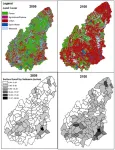(Press-News.org) Peer-reviewed / Randomised Controlled Trial / People
Clinical trial with 665 under-screened women in North Carolina (USA) investigated use of high-risk human papillomavirus (hrHPV) self-collection kits to increase cervical cancer screening uptake.
Screening uptake among participants sent self-collection kits and given support to attend an in-person appointment was almost double (72%) the cervical cancer screening uptake in those only given appointment support alone (37%).
More than three quarters (78%) of these underserved participants who were mailed a hrHPV kit returned a sample, suggesting effective community outreach plays a key role in increasing screening uptake among women at highest risk of cervical cancer.
The authors say their findings, together with those from previous studies, provide evidence that HPV self-collection kits have the potential to increase uptake of cervical cancer screening in under-screened women.
At-home high-risk human papillomavirus (hrHPV) sampling kits can help increase cervical cancer screening among under-screened women from low-income backgrounds, according to findings from a US-based clinical trial published in The Lancet Public Health journal.
The trial shows mailing kits to low-income, under-screened women and helping them book an in-person clinic appointment led to a two-fold increase in screening uptake compared to only offering assistance making an appointment.
The main cause of cervical cancer is persistent infection with a hrHPV, which puts women at risk of developing precancerous cervical lesions. Cervical cancer disproportionately affects Black and Hispanic women in the USA, with the highest incidence among Hispanic women and the highest mortality among Black women. Regular hrHPV testing in accordance with national screening guidelines reduces the risk of women developing the disease.
Current US guidelines on cervical cancer screening have several options. For women 21 years and over, a Papanicolaou (Pap) test every three years is recommended. For those 30 years and older, additional options include HPV cytology co-testing every five years or primary hrHPV testing every five years.
While previous studies have shown hrHPV self-collection kits can help increase cervical cancer screening, little research has involved under-screened women in the USA. Limited data is available on the combined effectiveness of using hrHPV self-collection kits and offering help scheduling in-person screening appointments.
Lead author Professor Jennifer S. Smith, University of North Carolina at Chapel Hill, US, said: “Until now, most studies of whether HPV self-collection increases cervical cancer screening have been outside the USA, in countries with national screening registries and universal health care. Our findings suggest programmes that use mailed HPV kits with effective community outreach can greatly improve screening uptake among underserved, at-risk women in the USA.” [1]
The authors conducted a randomised clinical trial involving 665 under-screened women in 22 counties in North Carolina, USA. Intensive community outreach campaigns – including printed and radio advertisements, online postings, community events and organisations and via a social assistance helpline – were used to recruit participants from underserved, under-screened groups and of racial and ethnic diversity.
The average age of participants in the trial – called My Body My Test-3 – which ran from 2016 to 2019, was 42 years, and more than half self-reported as Black or Hispanic (55%, 365/664 participants), uninsured (78%, 518/663), or unemployed (57%, 373/660). Women were only eligible for the trial if they had not received a Pap test in four years or more, or an hrHPV test in six years or more.
Participants were either sent hrHPV self-collection kits and given help booking an in-person appointment, or only given help making an appointment. The main outcome was cervical cancer screening uptake within 6 months of enrolment, defined as a negative hrHPV test result or attending an in-person screening appointment. Participants who tested positive for hrHPV by self-collection were referred to in-clinic appointment for further tests.
For participants who received mailed kits and help scheduling an appointment, cervical cancer screening uptake was almost double (72%, 317/438 participants) compared to those who received scheduling assistance only (37%, 85/227 participants). The benefits of home testing were similar regardless of participants’ age, time since last screening, race/ethnicity, insurance coverage, or level of education.
Among participants sent hrHPV kits, more than three quarters (78%, 341/438 participants) returned a sample. Valid hrHPV results were obtained for 329 participants, of whom 52 (16%) tested positive for hrHPV and were referred for follow-up appointments that 22 (42%) attended. Further tests detected CIN2+ lesions – which can progress to cervical cancer – in two (<1%) participants, who then received treatment.
Second author Dr Noel Brewer, of the University of North Carolina at Chapel Hill, said: “Government approval of at-home HPV tests would have a huge impact. We could better reach those in rural areas where cervical cancer screening is hard to come by. Also, only the people who self-test positive would need to go to a clinic for screening. For the many Americans without reliable access, cervical cancer screening from home would ensure they can get life-saving preventive care.” [1]
The authors acknowledge some limitations to their study. While the outreach approach used may oversample more motivated women and somewhat limit the study’s generalisability, it enabled recruitment of large numbers of at-risk women from the general population who do not regularly use clinic services. Mailed hrHPV kits do not meet the needs of all under-screened, hard-to-reach women. Consistent with other studies, less than half of participants with positive hrHPV results attended an in-clinic appointment, highlighting the need for further efforts to ensure continuity to care among those with positive self-test results. The trial was also conducted prior to the COVID-19 pandemic, so effects on screening uptake in the post-pandemic era could not be determined.
Writing in a linked Comment, Runzhi Wang, MD, and Jenell Coleman, MD, of Johns Hopkins University School of Medicine, who were not involved in the study, said: “This study provides the required evidence that high-risk HPV testing on self-collected samples can be an effective strategy for hard-to-reach populations.” They also call for developments to optimise the entire cervical cancer prevention process in the USA, saying: “Optimisation includes policy reforms to remove financial barriers to diagnostic tests and treatment; community outreach and education campaigns; and improved access to quality care through transportation services, expanded Medicaid eligibility, and skilled clinicians.”
NOTES TO EDITORS
This study was funded by the US National Institutes of Health. It was conducted by researchers from the University of North Carolina at Chapel Hill.
[1] Quote direct from author and cannot be found in the text of the Article.
The labels have been added to this press release as part of a project run by the Academy of Medical Sciences seeking to improve the communication of evidence. For more information, please see: http://www.sciencemediacentre.org/wp-content/uploads/2018/01/AMS-press-release-labelling-system-GUIDANCE.pdf if you have any questions or feedback, please contact The Lancet press office pressoffice@lancet.com
IF YOU WISH TO PROVIDE A LINK FOR YOUR READERS, PLEASE USE THE FOLLOWING, WHICH WILL GO LIVE AT THE TIME THE EMBARGO LIFTS: https://www.thelancet.com/journals/lanpub/article/PIIS2468-2667(23)00076-2/fulltext
END
THE LANCET PUB. HEALTH: Mailing at-home HPV sampling kits nearly doubles cervical screening uptake among hard-to-reach populations, US clinical trial suggests
2023-05-12
ELSE PRESS RELEASES FROM THIS DATE:
International Nurses Day: World’s oldest children’s nursing organization recognizes outstanding contributions to the care of children and young people
2023-05-12
At a recent event to celebrate the Association’s 85th Anniversary, the Association of British Paediatric Nurses awarded Honorary Fellowships to eight children’s nurses in recognition of their outstanding contribution to the nursing care of children and young people.
The 2023 Honorary Fellows
Ann Bisbrown Lee for services to children’s nursing and for many years’ service to the Association of British Paediatric Nurses, especially in leading marketing and conference activities.
Professor Steven Campbell for services to children’s nurse education and to the Association ...
Stress-management interventions may help individual healthcare workers for at least a year
2023-05-12
Interventions aimed at reducing work-related stress for individual healthcare workers may lead to improvements in how people cope with stress up to a year later. Findings from a Cochrane review of the latest available evidence build on the conclusions of a previous review in 2015 that found low-quality evidence that interventions, such as cognitive behavioural training (CBT), mental and physical relaxation, were better than none.
The researchers included 117 studies of the effects of different interventions on stress alleviation in the current review, of which 89 studies were new. These 89 studies were published between 2013 and ...
Research pinpoints the time of year and hour when people have the strongest suicidal thoughts
2023-05-12
New research has identified the month when people have the strongest suicidal thoughts, and that these thoughts occur a few months before the peak of suicide behaviours in spring/early summer. It also showed the daily peak in suicidal thought is between 4-5 am.
Most people assume suicide rates will be highest in winter, yet spring/early summer is when suicidal behaviours peak and this finding has baffled researchers since first identified.
Research from the University of Nottingham’s School of Psychology, led in collaboration with the University of Amsterdam and Harvard University, ...
AI study finds that patients with Parkinson’s disease speak differently to healthy patients
2023-05-12
Using artificial intelligence (AI) to process natural language, a research group evaluated the characteristics of speech among patients with Parkinson’s disease (PD). AI analysis of their data determined that these patients spoke using more verbs and fewer nouns and fillers. The study was led by Professor Masahisa Katsuno and Dr. Katsunori Yokoi, Nagoya University Graduate School of Medicine, in collaboration with Aichi Prefectural University and Toyohashi University of Technology. They published their results ...
Astronomers reveal the largest cosmic explosion ever seen
2023-05-12
A team of astronomers led by the University of Southampton have uncovered the largest cosmic explosion ever witnessed.
The explosion is more than ten times brighter than any known supernova (exploding star) and three times brighter than the brightest tidal disruption event, where a star falls into a supermassive black hole.
The explosion, known as AT2021lwx, has currently lasted over three years, compared to most supernovae which are only visibly bright for a few months. It took place nearly 8 billion light years away, when the universe was around 6 billion years old, and is still being detected by a network of telescopes.
The researchers believe that the explosion is ...
Scientists find fire records inside sand dunes
2023-05-12
A previously unrecognised sedimentary archive in sand dunes could unlock a repository of fire records, a discovery that could expand fire histories across the globe.
The research, conducted by Dr Nicholas Patton during his PhD at The University of Queensland, has solved a persistent problem facing historians investigating changing fire patterns.
“Knowing how the frequency and intensity of wildfires has changed over time offers scientists a glimpse into Earth’s past landscapes, as well as an understanding of future climate change impacts,” Dr Patton said.
“To reconstruct fire records, researchers usually rely heavily ...
Brain-belly connection: gut health may influence likelihood of developing Alzheimer’s
2023-05-11
Could changing your diet play a role in slowing or even preventing the development of dementia? We’re one step closer to finding out, thanks to a new UNLV study that bolsters the long-suspected link between gut health and Alzheimer’s disease.
The analysis — led by a team of researchers with the Nevada Institute of Personalized Medicine (NIPM) at UNLV and published this spring in the Nature journal Scientific Reports — examined data from dozens of past studies into the belly-brain connection. The results? There’s a strong link between particular kinds of gut bacteria and Alzheimer’s disease.
Between 500 and 1,000 species of bacteria ...
New research from UMass Amherst links changes in land use to water quality and quantity
2023-05-11
AMHERST, Mass. – Researchers at the University of Massachusetts Amherst recently published a study in the journal PLOS Water that focuses on the Sudbury-Assabet and Concord watershed in eastern Massachusetts, and which links hydrological changes, including floods, drought and runoff, to changing patterns of land use.
“We all live in a watershed” says Timothy Randhir, professor of environmental conservation at UMass Amherst and the paper’s senior author. “We’re constantly modifying our landscape, turning what were once forests into ...
UC Irvine study shows traffic-related air pollution in Irvine weakens brain function
2023-05-11
Irvine, Calif., May 11, 2023 – Researchers from the University of California, Irvine have found that exposure to traffic-related air pollution in Irvine led to memory loss and cognitive decline and triggered neurological pathways associated with the onset of Alzheimer’s disease.
“The link between air pollution and Alzheimer’s disease is concerning, as the prevalence of toxicants in ambient air is not just on the rise globally, but also hitting close to home here in Irvine,” said corresponding ...
Bail reform law in New York had negligible effect on increases in crime
2023-05-11
Across the United States, legislators and the public have debated the issue of bail reform, which aims to reduce pretrial jail populations by eliminating cash bail. New York State passed legislation in 2019 to limit the use of money bail and expand pretrial release. In a new study, researchers evaluated the effect of the law on state crime rates, considering the effect of the COVID-19 pandemic. Although rates of murder, larceny, and motor vehicle theft rose after the bail reform law went into effect, none of the increases were statistically significant when compared with a control group. This suggests that the effect of bail reform on crime rate increases was negligible.
The study, ...





